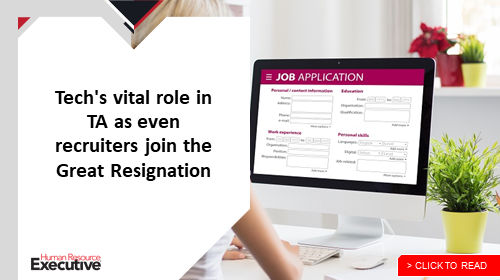Employers who think recruiting new talent is a challenge now are unprepared for the coming decade. Remote and hybrid work models are here to stay. And employees will not tolerate poor behavior from companies and their CEOs and managers.
These were just some of the standout themes that attendees heard from keynote speakers, industry experts and technology providers in their presentations and product demos at this week’s HR Tech Virtual conference. These important takeaways included:
Employee listening has never been more important.
American workers are leaving in droves and employers can no longer dismiss the Great Resignation as a phase. In response, HR is moving into a world of continuous listening for employees and their needs. “Employee feedback systems are designed to tell HR what’s broken and offer suggestions and feedback on why employees are thinking about leaving,” said Josh Bersin, HR industry analyst and HR Tech keynote speaker. “They should also be used to design a rewards program and help improve workers’ lives.”
 Your talent acquisition staff is reaching the breaking point …
Your talent acquisition staff is reaching the breaking point …
Even the recruitment team for General Motors is struggling to fill positions with qualified candidates. In fact, its talent acquisition team is overburdened and under-resourced, according to Kyle Lagunas, the automaker’s head of talent attraction, sourcing & insights. The result has become what he called “a reactionary recruiting operation at its finest.”
… and the job market will remain competitive until 2030.
Market researcher Korn Ferry products there will be 85 million unfilled jobs by the end of the decade. “This constant evolution of candidate expectations in what they want and the talent shortages are going to persist for years,” said Mark Brandau, vice president of portfolio marketing, and Christy Spilka, global head of talent acquisition, for talent acquisition provider iCIMS.
Employee burnout has hit the red zone.
The majority of U.S employees—55%—don’t use all their paid time off. “On average, one of every two of your employees aren’t taking full advantage of their PTO benefits,” said Adam Gordon, co-founder of PTO Genius, a tech solution used by employers to help manage PTO. “And that’s crazy because PTO is the second most-requested benefit across all generations [behind medical, dental and vision].” Reasons include fear of returning to a mountain of work, workplace pressures, guilt and not having money for a vacation. A majority of employees (62%) also are stressed, according to Oracle research, and taking PTO could help relieve some of that.
Learning and development could slow down the rate of employee exits.
When life gets hard, humans learn. “We pick up a new skill,” said Summer Salomonson, vice president of content products for L&D provider Cornerstone. And it can help slow down the exodus of workers who are seeking the next career milestone. “This is an employee’s market,” she said, “and this is [HR’s] opportunity to double-down on learning strategy and what gets people excited about work.”
Your empty offices will be transformed into event spaces.
Workers now operate and collaborate across different locations, time zones and devices. This means that traditional offices will resemble event spaces as live, in-person meetings transform into special events that require catering, detailed agendas and travel and accommodations for out-of-state employees. “If I am an employee, I [will] need a good reason to show up in an office,” said Melanie Lougee, head of strategy, employee workforce business, for ServiceNow.
High-performance work cultures must be intentional.
Higher pay, better benefits and other enviable perks are all on the table, to be sure. But many are finding that the secret sauce is a strong culture—one where employees feel valued and want to work. It’s the culture—“the invisible sticky stuff that keeps us at an organization and very much impacts our experiences there,” said Gianna Driver, chief human resources officer at cybersecurity firm Exabeam—that can make the difference.
Millennials and Gen Z employees take ESG—equity, social and governance initiatives—seriously and actively search for companies’ ESG scores before applying for jobs. HR leaders will have to work with IT, facilities, even finance and other departments to improve ESG scores across organizations with efforts that will create an enticing workplace. “A high score is not a good thing; you really want to have a low score,” said ServiceNow’s Lougee. “Corporate values matter to employees more than they do to customers or investors.”
Employee engagement has never been more important.
According to 2021 Gallup data, just 20% of workers are engaged in their work. “The assumptions of the past are no longer valid in the present,” said Ernest Ng, vice president of global employee success strategy and people analytics at Salesforce. “What we’re seeing in our research is that the conditions that drove engagement in the past are really different now.”
Employees need a sense of purpose, and not just a paycheck.
Although purpose, values and culture are frequently planned for and talked about in the boardroom, in reality, efforts can fall through the cracks or miss the mark. That is the often case in the world of HR and HR technology, in particular, said Jason Averbook, CEO and co-founder of Leapgen, during a passionate live HR Tech Virtual Conference presentation. “You’ve got to automate to humanate,” he told attendees. “Why is that so important? So we as humans can do the heart’s work.”
Registered attendees can view all of the HR Tech Virtual presentations until April 3 here.
The post 10 themes from HR Tech Virtual to help you prepare for the coming decade appeared first on HR Executive.
